“I am old and I leave my keys in the refrigerator. I look out the window at the moon and imagine that we’ve never been there. Not a single, damned one of us.”
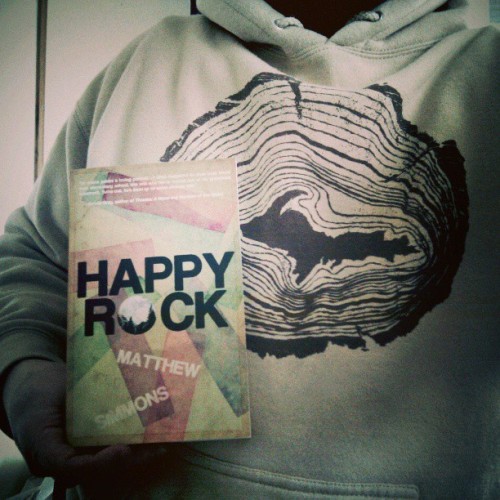 Happy Happy Rock day! Happy Rock is a book of stories by Matthew Simmons, seen at left wearing a shirt that’s about Michigan or something. If you have ever walked home through snowdrifts in the wrong shoes, and the only thing keeping your knees above collapse was the thought of your cat or your twelve-sided die, you will hold Happy Rock as tenderly as Matthew does in this picture. Except it will be open and you will be reading it. Everything is a kind of love story if by love you mean grey sand.
Happy Happy Rock day! Happy Rock is a book of stories by Matthew Simmons, seen at left wearing a shirt that’s about Michigan or something. If you have ever walked home through snowdrifts in the wrong shoes, and the only thing keeping your knees above collapse was the thought of your cat or your twelve-sided die, you will hold Happy Rock as tenderly as Matthew does in this picture. Except it will be open and you will be reading it. Everything is a kind of love story if by love you mean grey sand.



You will read it and be sighing because it’s right, it’s right, over and over again it’s smart and sad and correct. Here is a mention of a story way from the scarred beaches of 2010. And here is my favorite paragraph besides the ending from “Rabbit Fur Coat,” a story from Happy Rock that just went live a few days ago on The Collagist:
“Back home Boy went to the bathroom. Younger, he played a game where he had to leave the bathroom before the refilling of the toilet ended, imagining it as the countdown to an explosion. Older, he didn’t mind, but sometimes saw himself blown through the wall; ripped apart by hot, swift gusts of fiery air; scattered; his fingers embedded in the plaster; the bones of his toes like nails into the floor; his teeth, shrapnel. Now he rubbed his eyes. His grandmother knocked on the door to call him to the dinner table.”
The Doorknob Passage – A Conversation with Bennett Sims
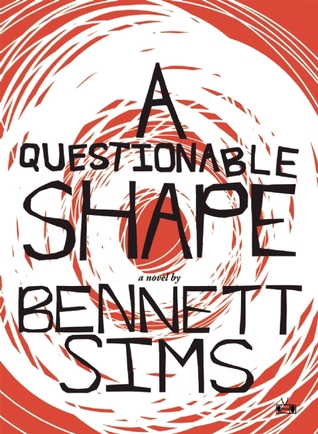
I’ve never read a zombie novel, and after reading A Questionable Shape, the debut novel from Bennett Sims, which has been described as a zombie novel, I still haven’t. We see glimpses of rabid zombies on grainy mall security cameras, ghost-like versions in a field, and zombies crowding a police car, but the book is more about retracing our memories, how to deal with loss, and ultimately, how to live in a world falling apart around us. It’s a philosophical mind-fuck of a novel filled with illuminating sentences and dark footnotes.
Bennett and I traded emails to discuss his time as a student of David Foster Wallace, paranoia, insecurities, influences, and push-ups.
Shane: So, how are you feeling?
Bennett: It’s the end of the semester, so I’m feeling somewhat hollowed out. This year I was teaching an undergrad fiction workshop here at the University of Iowa, and I wrapped up all my grading yesterday. Nabokov has that line about finishing a work, how he feels like ‘a house just emptied of its grand piano.’ It’s a little like that—except that instead of producing beautiful music, the part of me that’s missing is used to shooting off workshop letters and miscellaneous correspondence. So I guess I’m feeling like a house just emptied of its fax machine, which is a different kind of quietness. How are you feeling?
Shane: I’m depressed because I’ve been doing nothing but eating cookies and drinking coffee and now I’m crashing from it. I’ve never heard of that Nabokov line before but I like it. Pale Fire is a beast and my favorite of his. Did Nabokov influence A Questionable Shape? I see some of his wordplay and magic in your sentences.
Bennett: Sorry to hear about the cookie-and-coffee comedown. I usually have to take a nap when that happens.
Thanks for the kind words about the book. I’m flattered by the Nabokov comparison. He’s definitely a background influence—one of the stylists I’ve admired longest, whose sense of wordplay and whose sheer felicity of description I’ve tried to absorb. But I was not thinking about any particular work of his when drafting A Questionable Shape. The footnotes, for instance, were self-consciously modeled on Nicholson Baker’s The Mezzanine, rather than Pale Fire.
Baltimore Book Club on Joe Hall
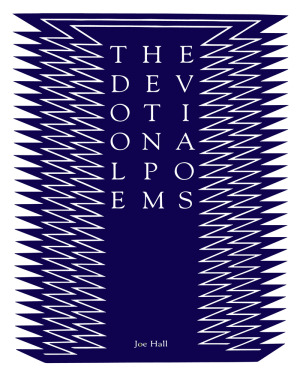 Discussed: The Devotional Poems by Joe Hall
Discussed: The Devotional Poems by Joe Hall
Present: Joseph Young, Amanda McCormick, Tracy Dimond, Caryn Lazzuri, Laura van den Berg, Linda Franklin, Matthew Zingg, Jamie GP, Chris Mason, Dave K, Adam Robinson
Tardy: Megan McShea
Jamie GP: Don’t read anything, don’t read anything about Star Trek, just go see it.
Adam: Chris, I just told everyone we are going to take notes and put them on HTMLGiant like a review, is that okay?
Chris: Cool.
Adam: With all our names.
Chris: Cool.
Joe: All right. Do people like this book? I mean I want to call this guy Joe Hallmark because it’s so sappy.
Dave K: Oh!
Linda: I actually didn’t like it at all. I liked about 8 lines. READ MORE >
Ali Liebegott Obsessed
 Cha-Ching!
Cha-Ching!
by Ali Liebegott
City Lights / Sister Spit, 2013
252 pages / $15.95 Buy from City Lights or Amazon
I was furious with Ali Liebegott for writing a novel. We’d lost another poet to the tyranny of fiction. But really, we gained Ali’s careful witness to luck, desperation, and desire, now turned to the queer project of making a world.
Gaines and losses are perhaps apt metaphors for Cha-Ching!, Liebegott’s latest work, in which gambling figures as a central theme. But for Theo, its main character, gambling is about more than fortunes. Gambling is a currency of hope.
Fuck reviewers citing “universal” concerns that appeal to “general” audiences. This character is a self-made, self-secure “sirma’amsir,” and an appealing one. Always on the brink. Of going broke, of drinking again, of saying the wrong thing to the right lover.
Cha-Ching! is an addiction story without recourse to self-help and redemption. It’s a romance built not from exchanging vows, but traumas, drugs, and fluids. You had me at the puke on my sheets. The characters are always making something out of nothing—a dime into a jackpot, a shitty apartment into a home, a blank sky into a declaration of love. It’s gruesome. It’s hilarious. It’d make a puppet out of the hardest of hearts.
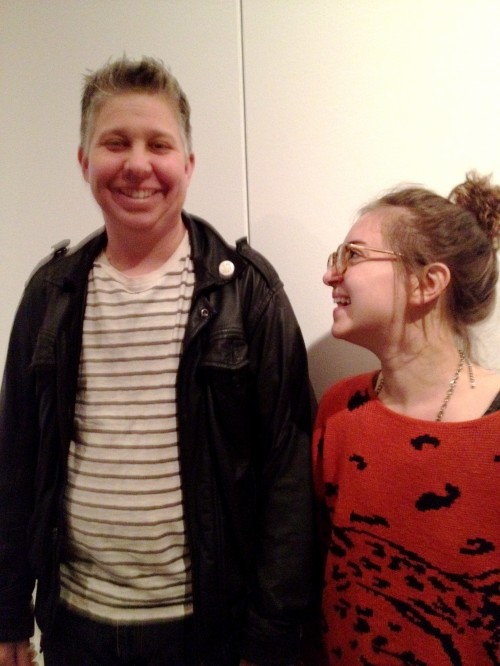
I caught Liebegott in the middle of her Sister Spit tour to ask her about her many obsessions. When her tourmates weren’t asking her for keys to the van she was driving, this is what happened:
TJR: If you had the choice to make out with Dostoyevsky or Van Gogh, who would you pick?
AL: I think Van Gogh, but that might be ageist, because I think I’ve only ever seen portraits of Dostoyevsky as a balding man. Van Gogh had really bed teeth, right? I think Van Gogh, although they both seem like terrible problematic relationships, so either would do. It’s tough. But probably Van Gogh.
May 10th, 2013 / 11:00 am
VanessaPlace Inc. launch this Friday

You are invited to a press conference on May 3, 2013 at CAGE83, 83a Hester Street in NYC to announce the official launch of VanessaPlace Inc. (http://vanessaplace.biz/).
VanessaPlace is a trans-national corporation whose sole mission is to design and manufacture objects to meet the poetic needs of the human heart, face, and form. We are what we sell, we sell what we are – It’s not the point, it’s the platform. Here is a press release with more details on this project.
On the evening of May 3, CEO Vanessa Place will introduce VanessaPlace Inc. and its core management team:
– Joseph A. W. Quintela, Director of Finance (New York)
– Ana Bozicevic, Director of Marketing (New York)
– Steve Giasson, Director of Production (Montreal)The launch will feature the exclusive debut of the first object-product of VanessaPlace Inc., a very limited edition of which will be available only at the press conference.
We are also seeking sponsors for the event – more details on that here: http://vanessaplace.biz/news/
Hope to see you there — let me know if you have any questions.
Warmly,
Ana
Ana Bozicevic
Marketing
VanessaPlace Inc.
http://vanessaplace.biz/
Facebook event page: https://www.facebook.com/events/136364639880000/
Gabe Durham’s FUN CAMP: “Anything that doesn’t send you to the showers isn’t worth laughing at.”
 Fun Camp has the skinniest low voice. Fun Camp has the most earnest eye width. Fun Camp is tall and kind and stalwart and genuinely funny, sweetly so, like the difference between a blackberry and corn syrup. If I could compare Fun Camp to a season, it would be early May, which is a problem, because most summer camps take place after that, and Gabe Durham wrote a novel about summer camp. It’s called Fun Camp.
Fun Camp has the skinniest low voice. Fun Camp has the most earnest eye width. Fun Camp is tall and kind and stalwart and genuinely funny, sweetly so, like the difference between a blackberry and corn syrup. If I could compare Fun Camp to a season, it would be early May, which is a problem, because most summer camps take place after that, and Gabe Durham wrote a novel about summer camp. It’s called Fun Camp.
The novel is made up of little frosted mini wheats of prose—”monologues, speeches, soliloquies, sermons, letters, cards, and lists”—thereby marking Fun Camp a deconstruction of a genre (the summer camp genre) that (let’s admit) is kind of addictive no matter how you shoot it. I mean, there are parts of this book that are literally better than Wet Hot American Summer. Yeah. For real. I’m not blowing watermelon relays up your ass. It’s not hard to read this book at all—this book is fucking entertaining. It’s sticky with zingers.
Gabe is someone you are like: how did that sweet young man just make it so funny? Because real funny is never sweet. Forget what I said earlier. It’s not even laughter we mean, exactly. Real true funny is the thin cotton sheet with the eye holes poked out that we wear over our totally freakiest cruelties.
In Fun Camp, there is free time, pig’s blood, sucky trees, Satanic goats. There is that tentative adolescent insanity we’re still getting over. Don’t take my huck for it. Get the book. $9 at PGP, early bird special. It’s the book of the summer. PeterBD, in fact, says it’s the “book of 2013.” Below the jump, I will shut up and hand over the sharing baton to some of what’s actually in this lovely young book. READ MORE >
On Violence & Red Tales: An Interview with Susana Medina
I met Susana Medina at the inaugural reading of Book Works’ Semina series in June 2008. Her struggle with deafness and affection for Borges made her immediately endearing. Between shots of whisky and glasses of Haut-Medoc, we talked. Chitchat mainly about films and books, but somehow the talk became serious and autobiographical.
Born of a Spanish father and a German mother of Czech origin, she grew up in Valencia, Spain. Her short film Bunuel’s Philosophical Toys, deconstructs the instances of fetishism in the films of Luis Bunuel. Over the years I’ve come to believe that the gap between what Medina has accomplished in her doctoral thesis on Borges, and what her mainstream colleagues have passed off as literary theory, exposes academic discourse for what it is — an imaginary labyrinth without beginning or end that presupposes its own epistemological superiority.
This interview, started March 2011, has been in the making for nearly two years. I spoke with Susana off and on via Facebook.
***
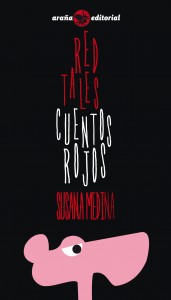 Maxi Kim: Stewart Home recently described your new book RED TALES as “a total shock to mummy porn fans – E. L. James meets J. G. Ballard! Makes both writing and BDSM dangerous once again.” I personally found it much more readable and theoretically latent than much of what passes today for Feminist writing, much more so than even Kate Zambreno’s Heroines. How did this project come to be? What are its origins?
Maxi Kim: Stewart Home recently described your new book RED TALES as “a total shock to mummy porn fans – E. L. James meets J. G. Ballard! Makes both writing and BDSM dangerous once again.” I personally found it much more readable and theoretically latent than much of what passes today for Feminist writing, much more so than even Kate Zambreno’s Heroines. How did this project come to be? What are its origins?
Susana Medina: I like your way of putting it, ‘theoretically latent.’ Red Tales came about through a cluster of concerns. I was interested in fluid sexualities, gender, androgyny, the irrational, compulsions. All the stories are narrated by wayward female narrators. To articulate a defiant female gaze was important for me. In a way, looking at the female nude in Art History, made me want to make all these women speak back. So maybe I became a ventriloquist for these sensual women who seemed so quiet. It was also a reconciliation with narrative, as my first novel, a fragmentary anti-novel, had as its point of departure the most minimalist Beckett. My interest in poetic fragments remained and I intertwined it with fast-moving narrative, so I suppose there is this newly found pleasure in narrative, with the fragment as counterpoint and vessel for interiority, as well as for the fragmentary realities we live. All the stories are conceived as spaces, like art installations. The image was central to all the narratives. I was really interested in American female artists like Cindy Sherman, Jenny Holzer, Kruger, the vanished Cady Noland, in subjectivity and identity as fluid entities… Thank you about the Kate Zambreno’s Heroines reference, which I googled straight away. Like I googled E.L. James when I came across Stewart Home’s blurb, which I thought was nicely confusing. By the way, I hadn’t read JG Ballard at the time –he was later to become one of my favourite writers-, but the connection is there, in terms of a shared interest in the psychopathology of everyday life.
MK: What do you make of Marie Calloway?
SM: I don’t know her. Who is she? Interesting?
MK: Interesting? It depends on who you ask. Like you, she’s interested in fluid sexualities, gender, compulsions, articulating something that approaches a defiant female gaze. She has put out public nude photos of herself with texts that overlap; there may be a parallel here with your project of looking at the female nude in Art History. I am reminded of that last scene in Lars von Trier’s Antichrist (2009) when all the wayward anonymous females climb up the hill to presumably kill Willem Dafoe.
SM: Googled her and printed an article, but still haven’t quite woken up. She sounds interesting, like Chris Kraus. You’ve worked with her, haven’t you? Or related? Cousins?
Needing Earl M. Rauch
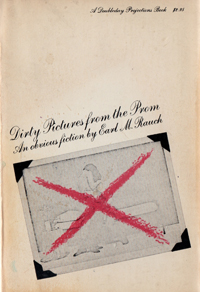
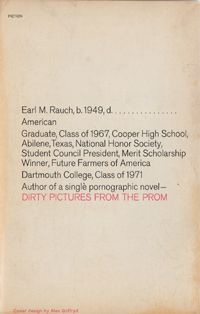
I discovered Earl M. Rauch’s Dirty Pictures from the Prom on a miserable snowy day this January (2013). As is occasionally the case, I decided to spend said miserable snowy day inside as much as possible—it was a Friday, and after finishing up the day’s classes I wandered over to an antique store in Eau Claire, Wisconsin; a place not known exclusively for its cultural presence (Bon Iver lives here, I guess, some fantastic sauce is made here at Silver Springs, and before dying in a plane crash several days later Ritchie Valens, Buddy Holly, and J.P ‘The Big Bopper’ Richardson played here at a building that’s now defunct). This antique store is massive, and awhile ago I used to come here and collect old issues of Esquire with pieces by Hemingway, Fitzgerald, and the like, as well as old paperbacks I’d never heard of. This particular day I already held two Iris Murdoch hardcovers before looking at a shelf on my way out and seeing a spine that read in a florid cursive ‘Dirty Pictures from the Prom Earl M. Rauch Doubleday’ and already having a copy of Under the Net at home I still had yet to read, I dropped the Murdoch books immediately and picked up this strange text.
While in the store I looked up Earl M. Rauch and discovered the book for sale online for prices seldom lower than 100 USD; this made me want to buy it. He was also a largely unknown person who apparently wrote this—his magnum opus, though not his only contribution to mankind’s literary heritage (more on that momentarily)–when he was only nineteen years old; that, plus the heft of this obviously well-conceived novel, made me want to buy it even more. Then further reading in various biographical pieces about Rauch and his prodigious fascination with writers like Pynchon, made me decide that this was the only book I’d ever truly need and that I’d spend the weekend doing nothing but reading it from cover to cover. And so I did.
Some notes on the technique:
1. This book is largely comprised of a straightforward, picaresque narrative about a character named (Osgood) Barnaby Saltzer. Chapters begin and end and as a result you’ve moved on several moments/months/years in his life and been entertained along the way. However, Barnaby had a younger brother named Creynaldo–a prodigious genius, having died when he was only seven and already written many cherished works–and the book features a great deal of his poetry/drawings as well. Furthermore, at the end of many chapters–and before a few, later on–there are notes from conversations between this story’s author Barnaby Saltzer, and his editor; hence the occasional portions where large X’s are printed through entire pages that the editor deemed unworthy–a practice of ‘bracketing’ in the deconstructionist tradition that only serves to make you read harder.
2. Though obviously influenced by the Pynchon novels available at the time (1969) in his extremely funny descriptions of a dangerous and fast-paced America, I daresay Rauch achieved something entirely novel with this work. This is apparent on the cover, ‘An Obvious Fiction,’ calls to mind the typing of Exley’s A Fan’s Notes as ‘A Fictional Memoir’. Rauch seemed to know at an extremely young age that he’d achieved something unprecedented in this regard. Of course variations on this theme of the broken and commented-upon narrative existed, but not quite like this and very seldom in a package as successful as Dirty Pictures.
Blaster Al Ackerman (19xx – 2013)
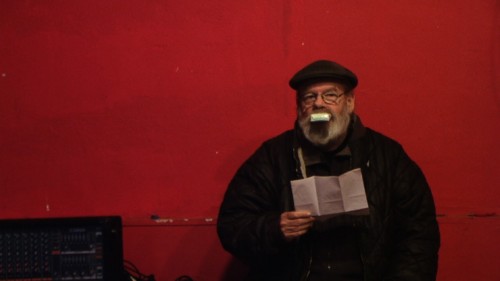
Blaster Al Ackerman passed away in mid-March. (Link there is to a very nice remembrance by our own Adam Robinson.) Some folks who knew him wrote some things about him. Michael Kimball and Rupert Wondolowski collected them for HTML Giant. Here—accompanied by some photos and some of Blaster’s mail art—they are.
————————————————————————-
I met Blaster in the flesh only once. He was ludditical, sweet, grumpy, and eventually he put a bar of soap in his mouth. Soon after he moved to Austin, I picked up some shifts he had vacated at Normal’s Books & Records, and there his absence was a constant presence — notes from Blaster, paintings by Blaster, & stories of Blaster: goofing on telemarketers, giving fucked up directions to the Book Thing, &c. It got so I was seeing his influence all over Baltimore — particularly among that stripe of Baltimore artist that believes in the prank as a spiritual path and one’s life as a work of art.
– Bob O’Brien
————————————————————————-
Dr Ackerman alias Blaster, who prepared himself at the age of 6 to outclass both Dante and Mark Twain, is one of the most enigmatic writers of the current literature of outcasts and damned poets. He is the author of such masterpieces as “The Fifteen Bath Towels” and “2976 Vienna Sausages,” not to mention “The Ecstasy of Macaroni.” In March/86, after being arrested for the millionth time for dancing naked, holding a flaming steam iron in his right hand and a half empty bottle of Whyte & Mackay scotch whiskey in the left, in front of a shopping center in San Antonio, Texas, he pointed out very clearly in a confessional letter (Confessions of an American Ling Master) he has sent from jail to the major of San Antonio that poetry is a social issue and not just a question of publishing and selling books.
-Istvan Kantor Monty Cantsin? Amen! Esmeralda Eldorado Sawang READ MORE >
Outfit and Poem for Springtime
I am invariably unimpressed by spring. Warm weather and sun aren’t traits that I find becoming. But still… spring does mean that you can wear clothes that you wouldn’t wear otherwise. So here is an outfit that I recently assembled:

Vintage Olympic t-shirt from a Goodwill in Missouri, polka dot tights by American Apparel, sunnies from a Chinese person on East Broadway, and UO boots
Also, here is a spring poem that was first published on Lambada. It’s authoress is the marvelous Monica McClure. If I was a boy who liked girls I would probably like Monica McClure, and we would most likely live in a really special place, and only those cognizant of certain things would be able to keep company with us:
Problems of Spring
It’s not my fault; the moon is shining through me.
Naturally, the most romantic steps forward
to say he swallowed a daffodil for every lover he’s had.
I can see where they dimple his stomach, I can see
the hardiness of arms, the artless shoveling
he’ll do from night to joyful morning.
To release me will dry his mouth to lemon,
I know, but I need the gaze of a man more than rain.
Another Bacchanalia in April, and I have only
half a body to dance, half to steady a canyon.
Nobody knows how to stay or leave. It’s not my fault,
although the way white blossoms look like hail
when they’re thrashed in a storm—it’s a pity.

